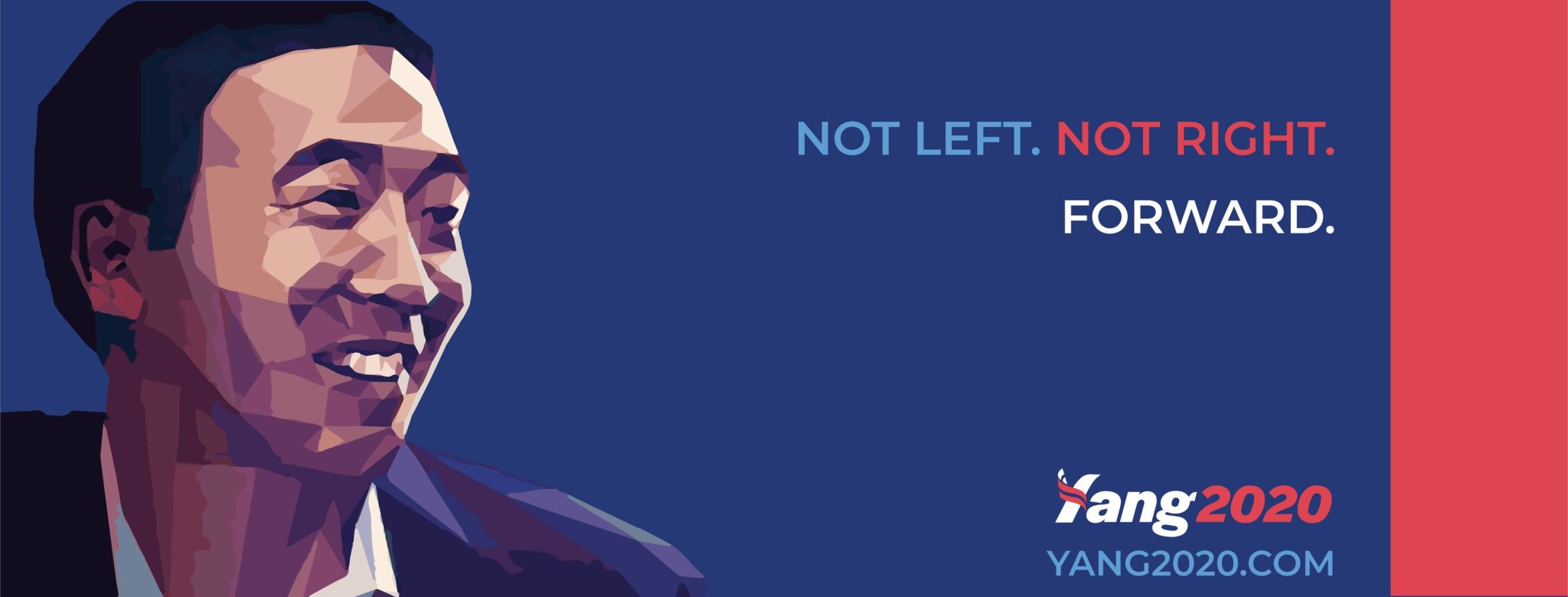
By Malia Mackey—
Minerva Strategies recently spoke to two committed Yang supporters, Hannah Won and Trevor Russell. Hannah went to Grinnell, Iowa to canvass for Yang ahead of the caucus, and Trevor is deeply embedded in the Yang network, active on social media, and happy to share his enthusiasm with everyone he encounters. In a series of posts throughout the primary season, Minerva is studying the communication strategies of a few presidential campaigns. With so much competition for the Democratic nomination, candidates are doing whatever they can to set themselves apart, share their strongest positions, and build coalitions.
Andrew Yang, “a former tech executive [who] warns of the perils of automation and wants to provide every American with a ‘universal basic income,’” according to the New York Times. This description, while accurate, misses Yang’s eccentricities and the factors that make him, in Yang’s own words, “the opposite of Trump”—an Asian man who likes math. The Washington Post adds, “Yang is the product of so many colliding forces in contemporary America that comparisons to anyone who came before him are kind of useless.” Needless to say, Yang is a unique candidate and his communications are no exception.
From our conversations, we identified three factors that differentiate the Yang campaign from others in the crowded Democratic field.
The Freedom Dividend
While the Freedom Dividend—what Yang calls his flagship universal basic income policy—is not a communications tactic, this Yang calling card cannot fit neatly into an entrenched political narrative, so it’s the perfect place to start as a communicator. It opens the conversation and piques curiosity instead of triggering partisan reactions that kill conversations.
While Yang has one of the most extensive policy lists on his website, the Freedom Dividend is so far afield from what others are talking about that conservatives have not been able to pin this to a liberal agenda, and instead poke at the concept with curiosity. I mean, what conservative can argue with freedom or dividends? We invest in this country, why shouldn’t we see a return?
So while not a tactic, the broad appeal—or at least the broad curiosity—of this policy is a campaign communication strength.
Yang is his best campaigner
Instead of explaining Yang’s policies to people at their doorsteps, canvassers will give the cliff’s notes and then send those interested to his website: yang2020.com. Hannah noted that this user-friendly and information-packed site is, hands-down, the website she visits most often, and she frequently directs others to it.
But Yang didn’t stop with a great website. Realizing that many caucus-goers don’t have access to the internet, the campaign instead provides the option for voters to hear straight from Yang via phone by dialing (515) 400-0401. Call the number…it works!
When we spoke to Trevor, he described Yang as a patient teacher. Without being condescending, Yang explains complex topics like human-centered capitalism and universal basic income in ways that are accessible to anyone who can pick up a phone. We heard stories from Hannah and Trevor of people needing to hear the information straight from Yang. It’s easy to dismiss out-of-the-box thinking as unrealistic and Yang wants to make sure his supporters know he’s thought through his policies, and that they are possible with the right political will. When Yang is in front of the microphone, he can break down the concepts and shift the perceptions of his ideas from far-fetched to innovative.
The #YangGang, an online powerhouse
Of all the candidates’ followings, Yang’s has sufficiently saturated social media. This is obvious when you search the hashtag #YangGang on Twitter. This doesn’t mean other campaigns have not effectively wielded social media, but the #YangGang is special in its dedication. Relentless positivity is how we describe the culture of his supporters, following Yang’s own optimism. This group is capable of getting hashtags like #GetYangonEllen trending on Twitter and wielding Reddit as a crucial information hub for their internet base.
Like any successful communication tactic, Yang’s campaign and his followers can convert this online buzz into real action which they call “URL to IRL.” This movement brought Yang supporters from all corners of the country and the internet to in-person Yang events, posting selfies with internet friends they met through their love of Yang.
From their blue hats to their social media know-how and ability to convert URL to IRL—the Yang Gang is hands-down the campaign’s strongest communication asset.
We hope you enjoyed this analysis from our conversation with organizers from the Yang Gang. Stay tuned for more Minerva insights into how campaigns are communicating during this election year.
UPDATE: On account of the pandemic and narrowed presidential candidate field that swiftly followed this post, our campaign series was halted. With the rest of the world, we were consumed by the endless pandemic news cycle.

